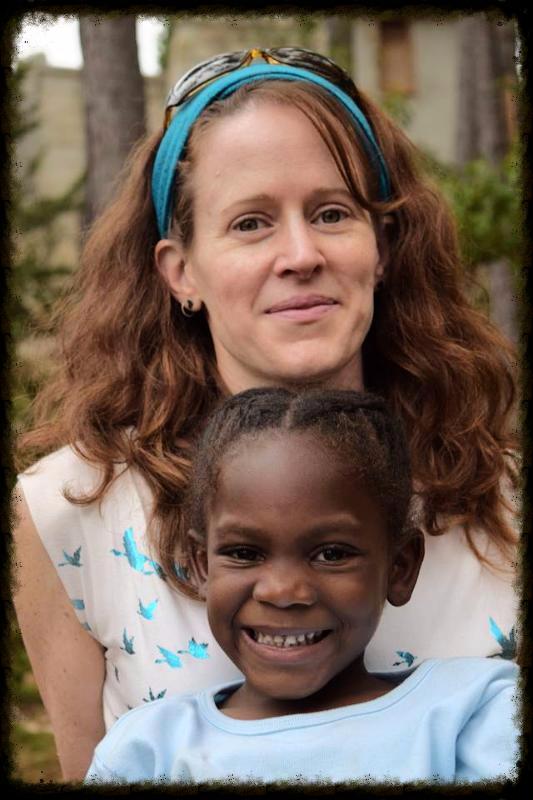Enriching Lives in Haiti
The mission of NPC Research is to improve programs to enrich people's lives, and one staff member is applying her skills to support this mission in some of the most high-need and low-resource areas of the world. Kelly Jarvis (pictured below with a Haitian child), Senior Research Associate, volunteers for the TRIAD Trust, a nonprofit organization whose mission is to reduce the incidence of AIDS-related death, prevent the spread of HIV, and build healthier communities in the areas of the world hit hardest by the HIV epidemic.
 TRIAD works with local organizations and community leaders to implement an innovative performing arts-based prevention education program in local schools. TRIAD's programs have been based in the Nkomazi region of South Africa until 2015, when they expanded to Haiti. Dr. Jarvis recently traveled to Haiti with TRIAD to assess community needs and strengths, build capacity in the local partnering organization, and help establish the infrastructure for the new program chapter. She will continue working with the organization to support the successful implementation. For more information on the TRIAD Trust, visit www.triadtrust.org
|
 |
|
Web-Based Tool Simplifies Cost-Benefit Analysis for Home Visiting Programs
NPC Research and Portland State University recently partnered to develop the Home Visit Cost Tool, a free, web-based interactive guide to early childhood home visiting program cost and cost benefit analyses. A federal grant from the United States Department of Human Services, Administration for Children and Families, Children's Bureau, funded the effort.
The tool is designed to lead program directors, managers, and researchers through "the basics" of cost-benefit analysis. The tool can be used to better understand the costs of key components of home visiting programs (such as costs related to screening, training, and travel). It also provides examples and resources for estimating cost-benefits for early childhood home visiting programs. You can visit the tool at www.homevisitcosts.com and watch a 4-minute introductory video.
To learn more about the study, Testing the Effectiveness of Healthy Families America: Outcomes and Cost-Benefits of the Healthy Families Oregon Program, click here.
|
Random Assignment Study of Drug-Addicted Property Offenders Shows Benefits of Drug Court
Oregon's Measure 57 required post-adjudication intensive drug court services for medium- to high-risk property offenders. NPC collaborated with the Oregon Criminal Justice Commission, Department of Corrections, and other partners to conduct a randomized control trial study to evaluate the effectiveness of Measure 57 drug courts, compared to traditional probation. The study included many components, including a process evaluation, interview study, preliminary outcome study, and cost analysis. The outcome evaluation found that the drug court group had significantly lower recidivism including 28% fewer new charges and 26% fewer new cases (cases can contain multiple charges), than the control group (a group of offenders who received traditional probation). When charges are categorized, drug court participants also had significantly fewer felony, misdemeanor, and drug charges. Overall, the drug court group had 37% fewer new charges for drug crimes than the control group. A follow-up evaluation with a longer time frame to analyze recidivism is planned.
Many of the participants in the study were prison-eligible under Measure 57, and this evaluation provides support for drug courts as an effective alternative to prison. The Measure 57 Intensive Drug Court Program was one strategy within the continuum of services and programs for all offenders involved in the criminal justice system.
|
Adding Children's and Parenting Services Helps Court Increase Family Reunification and Reduce Child Maltreatment
The Clark County, Washington, Family Treatment Court (FTC), through a SAMHSA Children Affected by Methamphetamine (CAM) grant, implemented new evidence-based services for children and their parents. NPC Research conducted a rigorous, comprehensive, multi-method evaluation throughout program implementation (2010-2015). Results showed that children of FTC program participants were significantly less likely to be victims of any type of maltreatment than children of parents who were eligible for the program but did not participate. In addition, children of program participants were less likely to be physically abused and significantly less likely to be neglected 2 and 3 years following program entry. In addition children of FTC participants were more likely to be reunified and stay reunified with their parents than children of parents who were eligible for the program but did not participate (63% vs. 49%, respectively). An analysis of costs showed an estimated savings of $10,230 per FTC participant, which translates to resources (such as out-of-home care placements) now available for other children.
NPC's comparison of outcomes for FTC participants before and after the implementation of CAM services shows even more promising results. Adding children's and parenting services was significantly associated with improvements in child welfare outcomes compared with those experienced by FTC participants before such services were available. Specifically, at 2 years post program entry:
► Parents who participated in CAM services had significantly fewer allegations of child maltreatment.
► Children of CAM participants had significantly fewer out-of-home placements.
► Children of CAM participants were less likely to be victims of maltreatment.
|
|